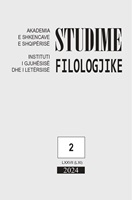Emrat e përveçëm letrarë dhe problemet e transmetimit të tyre nga gjuha ruse
Proper literary names and problems of their transmitting from the Russian language
Author(s): Avni XheliliSubject(s): Russian Literature, Eastern Slavic Languages, Philology, Theory of Literature, Sociology of Literature
Published by: Qendra e Studimeve Albanologjike
Keywords: anthroponym; toponym; transmission; literary work; proper name; real name; fictitious name; transcription; transliteration; calculus;
Summary/Abstract: The article points out the challenges faced when transmitting personal proper and place names from Russian literary works into Albanian. Since Russian uses the Cyrillic alphabet and Albanian uses the Latin one, transmitting proper names from Russian literary works presents not a few difficulties. Despite the strong tradition that has developed over the years, many instances of errors and incorrect translation choices persist. An analysis of Albanian translations of over 30 works by Russian authors in the last 70 years has demonstrated that the difficulties of transmitting Russian proper names into Albanian are due to a variety of causes. Among these causes, several stand out: differences in the phonetic system of these two languages and the different alphabets they use; the absence of a unified system for the transliteration of the anthroponymic and toponymic names; an insufficient set of rules and principles governing the translation of proper names from Russian; the obsolescence of some of the rules of the 1973 Albanian Orthographic Dictionary (Fjalori Drejtshkrimor), along with other factors. A direct result of these factors has been the erroneous translation choices, including the presence of several Albanian variants of Russian anthroponymic or toponymic names, as well as the distortion of Russian names. A significant challenge faced by translators is when transmitting proper names created by the authors themselves. Besides their naming function, these names often carry an extra semantic coloring aimed at achieving characterization. Often the Albanian translators have unified these proper names, but a different approach is required to create names that would convey the extra information they contain. The article provides concrete examples and relevant recommendations. Aside from the aforementioned causes, some deviations, distortions, and inaccuracies have resulted from the translators' lack of professionalism. Translations of Russian literary works have been undertaken not only by experts with philological backgrounds and specialists in the Russian language and literature but also by professionals from other fields (geologists, engineers, military, etc.), who primarily knew spoken Russian. It's only natural that their lack of qualifications has often made it challenging, if not outright impossible, to cope with the linguistic as well as non-linguistic difficulties when transmitting Russian proper names into Albanian. The article aims to propose a more durable solution for the translation of these proper names, benefiting translators and editors of translations of literary works from Russian into Albanian. Additionally, it contributes to furthering the academic discussion on transmitting proper names.
Journal: Studime Filologjike
- Issue Year: 2024
- Issue No: 02
- Page Range: 79-112
- Page Count: 34
- Language: Albanian

